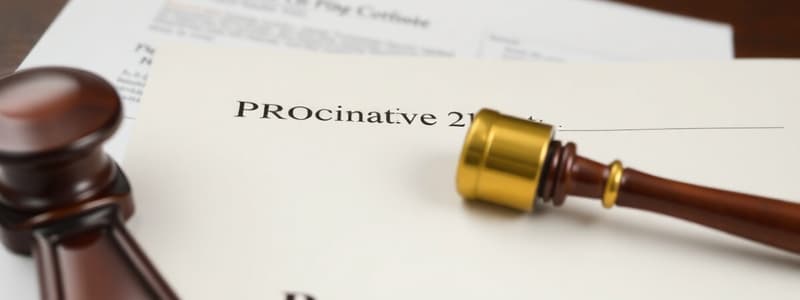Podcast
Questions and Answers
What is a declaratory decree?
What is a declaratory decree?
A declaratory decree is a court order that declares the legal status or rights of a person or property.
What is the purpose of a declaratory decree?
What is the purpose of a declaratory decree?
The purpose of a declaratory decree is to settle the legal rights of parties and remove any confusion about their status.
What is the rationale for using a declaratory decree?
What is the rationale for using a declaratory decree?
The rationale is to prevent damage from occurring before the legal rights of the parties are clarified and to resolve a legal dispute when a cause of action may not yet be established.
A declaratory decree does not require which of the following?:
A declaratory decree does not require which of the following?:
The court always has discretion to make a declaratory judgment.
The court always has discretion to make a declaratory judgment.
What is the effect of a declaration made under the Specific Relief Act?
What is the effect of a declaration made under the Specific Relief Act?
A declaratory judgment can be challenged on the ground that it is being sought.
A declaratory judgment can be challenged on the ground that it is being sought.
Certiorari can stop someone from applying for a declaratory judgment.
Certiorari can stop someone from applying for a declaratory judgment.
What did the court decide in Noorfadilla Ahmad Saikin v Chayed Basiron [2012] I MLJ 832?
What did the court decide in Noorfadilla Ahmad Saikin v Chayed Basiron [2012] I MLJ 832?
Flashcards
Declaratory Decree
Declaratory Decree
A legal pronouncement by a court formally establishing a person's right or status regarding property or personal affairs.
Legal Character
Legal Character
A legal position recognized by law, encompassing the attributes assigned to an individual in their personal capacity. It's often synonymous with 'status.'
Right as to any Property
Right as to any Property
A legal right to peacefully enjoy one's own possessions.
Declaratory Judgment
Declaratory Judgment
Signup and view all the flashcards
Discretion of Court as to Declaration of Status or Right
Discretion of Court as to Declaration of Status or Right
Signup and view all the flashcards
Rationale for Declaratory Decrees
Rationale for Declaratory Decrees
Signup and view all the flashcards
Declaratory Decree Suit
Declaratory Decree Suit
Signup and view all the flashcards
Section 41 of the Specific Relief Act
Section 41 of the Specific Relief Act
Signup and view all the flashcards
Certiorari
Certiorari
Signup and view all the flashcards
Illustration (d) of Section 41
Illustration (d) of Section 41
Signup and view all the flashcards
Illustrations (a), (b), and (c) of Section 41
Illustrations (a), (b), and (c) of Section 41
Signup and view all the flashcards
Section 42 of the Specific Relief Act
Section 42 of the Specific Relief Act
Signup and view all the flashcards
Order 15, Rule 16 of the Rules of Court 2012
Order 15, Rule 16 of the Rules of Court 2012
Signup and view all the flashcards
Effect of a Declaratory Decree
Effect of a Declaratory Decree
Signup and view all the flashcards
Study Notes
Declaratory Decrees
- Declaratory decrees are used to obtain a declaration of status or right from a court
- A declaration is a formal statement from the court about a person's right to property or status
- It's a binding declaration established in equity with potential consequences. It clarifies a right and removes any confusion about a party's status.
- Declaratory decrees don't require a separate cause of action.
Rationale
- In Petaling Tin Bhd v Lee Kian Chan & Ors, the court stated a rationale for declaratory decrees: obtaining desired relief before potential damage occurs, and clarifying the legal position.
Discretion of Court
- Section 41 allows anyone with a legal character or property right to sue someone denying or trying to deny this.
- The court has discretion to declare the person's entitlement and doesn't necessarily need further relief.
- However, if a plaintiff can seek further relief beyond a declaration (such as a title claim), the court will not issue a mere declaration.
Legal Character and Illustration
- Legal character is a legally recognized position defined by the law's associated qualities.
- Example: A being declared the son of B
- Illustration (d) in the Section 41 demonstrates complex situations involving legal character, property disputes, and clarifying marriage statuses.
Right to Property
- A right to property is the entitlement to peaceable enjoyment of one's possessions.
- Illustration (c) provided an example where A is in possession of property, and B claims ownership demanding A transfer it to B. A can seek a declaration of right to hold the property.
Continued Examples
- In Noorfadilla Ahmad Saikin v Chayed Basiron, a plaintiff sought a declaration of her employment rights after being denied employment due to pregnancy.
- The Court in Sugumar Balakrishnan v Chief Minister of Sabah, confirmed the court's discretion to issue declaratory judgments even if another remedy is available.
- Certiorari is a process where a higher court reviews a decision by a lower court.
Effect of Declaration
- Section 42 of the Specific Relief Act defines the scope of binding declarations under the specific relief act. These declarations in these cases are binding on the parties involved, those claiming or inheriting from the original parties, and on trustees.
Declaratory Judgment (O. 15, R. 16)
- Order 15, Rule 16 of the Court Rules, permits declaratory judgments without a need to pursue consequential relief.
- Courts may issue declaratory statements of rights regardless of whether a party seeks other remedies.
Studying That Suits You
Use AI to generate personalized quizzes and flashcards to suit your learning preferences.


